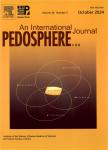Changes in profile distribution and chemical properties of natural nanoparticles in paddy soils as affected by long-term rice cultivation
在由长期的米饭耕作影响了的稻土壤在侧面分发和自然 nanoparticles 的化学性质变化作者机构:Institute of Soil and Water Resources and Environmental ScienceCollege of Environmental and Resource SciencesZhejiang UniversityHangzhou 310058(China) Zhejiang Provincial Key Laboratory of Agricultural Resources and EnvironmentHangzhou 310058(China) Department of LandAir and Water ResourcesUniversity of California-DavisDavis CA 95616(USA)
出 版 物:《Pedosphere》 (土壤圈(英文版))
年 卷 期:2021年第31卷第5期
页 面:659-669页
核心收录:
基 金:supported by the National Natural Science Foundation of China(Nos.41721001 and 41130532)
主 题:natural nanoparticle evolution soil chronosequence soil cultivation age soil genesis soil nanoparticles
摘 要:Systematic studies on the genesis,properties,and distribution of natural nanoparticles(NNPs)in soil remain *** study examined a soil chronosequence of continuous paddy field land use for periods ranging from 0 to 1000 years to determine how NNPs in soil changed at the early stages of soil genesis in eastern *** samples were collected from coastal reclaimed paddy fields that were cultivated for 0,50,100,300,700,and 1000 *** nanoparticles were isolated and characterized along with bulk soil samples(2-mm fraction)for selected physical and chemical *** NNP content increased with increasing soil cultivation age at 60 g m^(-2) year-1,which was related to decreasing soil electrical conductivity(172-1297μS cm^(-1))and NNP zeta potentials(from -22 to -36 mV)with increasing soil cultivation *** in several NNP properties,such as pedogenic iron oxide and total organic carbon contents,were consistent with those of the bulk soils across the soil ***,changes in NNP iron oxide content were obvious and illustrated active chemical weathering,pedogenesis,and potential impacts on the microbial *** analysis demonstrated that the soil cultivation age was the most important factor affecting NNP properties,contributing 60.7% of the total *** and principal component analysis(PCA)revealed splitting of NNP samples into age groups of 50-300 and 700-1000 years,indicating rapid evolution of NNP properties,after an initial period of desalinization(approximately 50 years).Overall,this study provides new insights into NNP evolution in soil during pedogenesis and predicting their influences on agriculture and ecological risks over millennial-scale rice cultivation.



